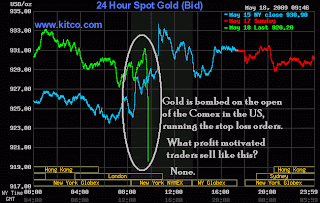“The terrible, cold, cruel part is Wall Street. Rivers of gold flow there from all over the earth, and death comes with it. There, as nowhere else, you feel a total absence of the spirit: herds of men who cannot count past three, herds more who cannot get past six, scorn for pure science and demoniacal respect for the present. And the terrible thing is that the crowd that fills the street believes that the world will always be the same and that it is their duty to keep that huge machine running, day and night, forever." Federico Garcia Lorca
 A short term counter trend rally today helped stocks to recover from the recent lows, and continue the intermediate term rally off the lows from earlier this year.
A short term counter trend rally today helped stocks to recover from the recent lows, and continue the intermediate term rally off the lows from earlier this year.The London office of Goldman Sachs apparently triggered this rally with some upgrades in the banking sector, and a vicious bear raid in the precious metals. The bond also sold off as investors are enticed to buy US equities.
The earnings results of Lowe's were trumpeted heavily by the demimonde of Wall Street, but it is most likely the natural reaction of consumers to seek to improve their infrastructure as they hunker down and cut back on discretionary purchases. It by no means contradicts the overwhelming economic evidence.
Wall Street has a few IPOs it wishes to bring out this week to test the waters for a larger IPO from AIG of one of its units. And of course the banks continue to sell secondary offerings.
If something looks like bait, and smells like bait, it probably has a hook in it somewhere.
The notion of trading in markets against market makers and insiders trading for their own trading profits heavily equipped with zero cost government funds and advantageous information would be almost laughable if it was not such a tragic abuse of productive capitalism and free markets.
 Keep that in mind when you trade the short term, or try to interpret the daily actions of the markets. Most short term movements have nothing to do with the fundamentals, and everything to do with the dealers and shills peeking into your hand and running bluffs against the small traders and the funds and institutions.
Keep that in mind when you trade the short term, or try to interpret the daily actions of the markets. Most short term movements have nothing to do with the fundamentals, and everything to do with the dealers and shills peeking into your hand and running bluffs against the small traders and the funds and institutions.Most investors have no business trading options or forex or futures at any time.
Everyone's situation is different, but overal this looks like an especially treacherous bear market, made doubly difficult by the actions of the Treasury and the Fed in bankrolling malinvestment, imbalances and corrupted price discovery.
When in doubt, get out. Don't get hooked by greed. And don't step in front of a market operation to run prices up or down. Wait for the longer term trends to assert themselves, and avoid the trap of calling tops and bottoms and attempting to be 'the first' in ahead of a market move.
This rally 'could' have some legs if it becomes a determined effort to reflate the credit bubble supported by the power of the Treasury and the Fed, as we saw in 2003-6, which was a reckless and disgraceful abuse of the Fed's economic responsibilities.
We doubt they can do it again, but never underestimate the power of greed and fear over memory and prudence.



































